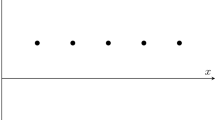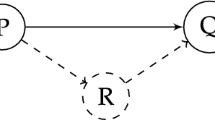Abstract
Here is a simple counterexample to David Lewis’s causal influence account of causation, one that is especially illuminating due to its connection to what Lewis himself writes: it is a variant of his trumping example
Similar content being viewed by others
Notes
Lewis attributes the discovery of trumping to Schaffer (2000). The example of the soldiers is from Bas van Fraasen.
There are multiple reasons why this scenario is immoral. We should not do such a thing.
Note that the pre-variant example is a counter-example in its own right. After we introduce the fourth rule, all the subjects say they follow both commands in agreement cases; nothing changes in the way their brains operate in such cases. A new explanation involving standard or trumping preemption requires a neurological change, one involved in the production of their agreement-case behavior. So they still follow both commands. The causal influence account denies this. For simplicity’s sake, I will concentrate on the variant in what follows.
I owe this objection to an anonymous referee from Philosophical Studies, whom I roughly paraphrase.
Events like I have been bracketed, recall.
All I need is that it’s unclear M’s order is not a cause of E.
I owe this observation to an anonymous referee from Philosophical Studies.
References
Choi, S. (2005). Understanding the influence theory of causation: A critique of Strevens. Erkenntnis: An International Journal of Analytic Philosophy, 63(1), 101–118.
Lewis, D. (1973). Counterfactuals. Oxford: Blackwell.
Lewis, D. (1986). Philosophical papers: Volume II. Oxford University Press.
Lewis, D. (2000). Causation as influence. Journal of Philosophy, 97, 182–197.
Noordhof, P. (2001). In defense of influence. Analysis, 61(4), 327–333.
Schaffer, J. (2000). Trumping preemption. Journal of Philosophy, 97, 165–181.
Schaffer, J. (2001). Causation, influence, and effluence. Analysis, 61(1), 11–19.
Strevens, M. (2003). Against Lewis’s new theory of causation: A story with three morals. Pacific Philosophical Quarterly, 84, 398–412.
Acknowledgments
Thanks for helpful comments to Judith Crane, Douglas Kutach, Robert Northcott, and an anonymous referee from Philosophical Studies.
Author information
Authors and Affiliations
Corresponding author
Rights and permissions
About this article
Cite this article
Stone, J. Trumping the causal influence account of causation. Philos Stud 142, 153–160 (2009). https://doi.org/10.1007/s11098-007-9180-2
Received:
Accepted:
Published:
Issue Date:
DOI: https://doi.org/10.1007/s11098-007-9180-2




